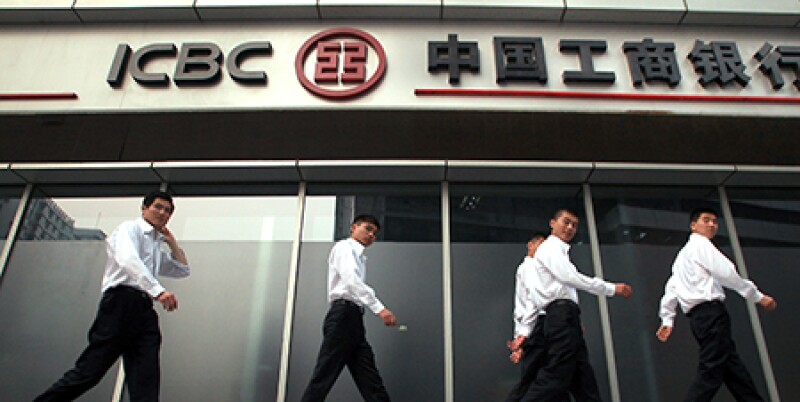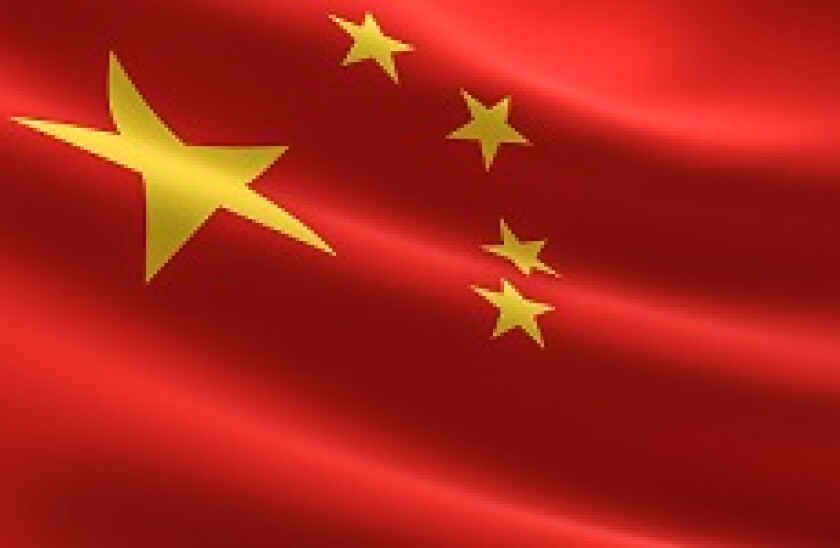BEST PROJECT FINANCING
Sino-American Energy $250m loan due 2021
Mandated lead arrangers: Bank of Communications, HSBC, Société Générale and Standard Chartered
The $250m reserve based lending facility for Asian American Gas (AAG) was a win for both the client and the lending group. It demonstrated that international banks were willing to take a view on onshore gas assets in China, while providing a level of accommodation that would allow for expansion of the company’s reserves in the future.
But a host of challenges had to be overcome to deliver the best package for both parties. The borrower, Sino-American Energy, a subsidiary of Hong Kong-listed AAG Energy, operates in the upstream oil and gas sector. That meant syndication took place amid extreme volatility in the price of energy commodities.
The team also had to overcome regulations limiting the amount of security that is allowed to be pledged against gas assets in China and there was no recourse to the parent, an internationally recognised name. If that was not challenging enough, keeping the loan under wraps was critical as AAG was due to IPO in June 2015, shortly before the financing was signed.
But a smart and lean syndication strategy meant the deal was completed successfully.
Only a handful of banks had expertise in upstream oil and gas project finance in Asia, and underwriter HSBC decided to focus its efforts on this select group. The cushion of regulated gas prices in China also gave the loan a leg-up.
The fundraising revealed new liquidity for Sino-American Energy and also gave banks a chance to form a relationship with the company.
BEST IPO
China National Nuclear Power Co Rmb13.2bn IPO
Joint bookrunners: Citic Securities and UBS
There can be few deals in any market that dominated the landscape quite as much as China National Nuclear Power Co’s IPO did in China’s equity market last year. The listing was the first A-share IPO for the country’s nuclear industry and attracted the largest frozen funds in subscription since 2009.
The demand for shares was such that the offline tranches, which were allocated 30% of the approximately 3.89bn shares on offer, were 121.22x oversubscribed before clawback. The take up of the online tranches was even greater at 142.99x oversubscribed before the clawback.
Investors certainly had to wait some time to get their hands on the shares. CNNP first announced its plans to list in May 2014. At that time IPOs in China were under one of their many suspensions as new reforms were brought in.
This meant the leads needed to work closely with the issuer to provide feedback to the regulator and resolve issues so that the IPO preparation would be complete when listings resumed again.
BEST FOLLOW-ON/ACCELERATED BOOKBUILD
Industrial Bank Co Rmb12.7bn secondary placement by Hang Seng Bank
Sole bookrunner: Goldman Sachs Gao Hua Securities Co
Of the hundreds of block trades that priced in Asia this year, none did it quite like Industrial Bank. Hang Seng Bank sold down a 5% stake in Industrial Bank in February, in a trade that broke barriers.
Hang Seng was looking to cash in on the 953m A-shares it held in Industrial Bank, mandating Goldman Sachs for the job. But there were huge challenges to overcome, not least the fact that an A-share block had never been distributed on a large scale before.
This was because block trades on the Shanghai Stock Exchange had only previously been sold on a piecemeal basis to one or two buyers at a time, and onshore market participants were not used to the kind of broad-based price discovery this deal was trying to achieve.
So Goldman set out to pioneer the first ever institutionally marketed A-share block sale in China, aided by the Shanghai-Hong Kong Stock Connect. The platform was key to sealing the deal as it created a bridge between China’s hard-to-access onshore market and institutional investors offshore.
But being the first mover also had its drawbacks. In order for the trade to be a success, Goldman had to educate a wide array of parties, including the stock exchange and regulatory bodies.
And because Goldman’s own QFII quota was too small to accommodate all the orders, it quickly pooled together about $3.5bn worth of QFII with the help of several banks.
Even when it came time to execute the block, there was plenty working against the lead. It had less than two weeks between kick-off and pricing. And with only a 30-minute window to cross the shares, time was not on its side. Goldman got around this by working on a minute-by-minute schedule with the brokers, detailing each crossing to make sure the trade went off without a hitch.
And it paid off handsomely. The block priced at Rmb13.36 a share, or a 7% discount to its last close. The trade also won our award for Best follow-on/accelerated bookbuild in Asia.
BEST EQUITY HOUSE
UBS
Navigating China’s equity capital markets is never an easy task especially in a year when important structural reforms went head-to-head with political and social considerations and often came out on the losing side.
Regulators certainly put plenty of obstacles in the way of equity market practitioners in 2015. Yet again IPOs were suspended, this time between July and November, as Chinese authorities battled to stop a stock market rout that had knocked trillions of dollars off the value of the country’s stock markets and off the wealth of its electorate.
For UBS, whose main strength onshore is bringing eye-catching IPOs to the market, this could have been a real setback. But in reflection of the strength of its franchise, the bank was the third biggest bookrunner for ECM activity in 2015, with league table credit of $5.8bn, according to Dealogic. While this is just over half of market leader Citic Securities’ $10.2bn, it was way ahead of its nearest international competitor Goldman Sachs in ninth place.
UBS worked on a number of major deals including the year’s second largest IPO, the Rmb13.19bn listing for China National Nuclear Power Co, which wins our award for Best IPO. It also led the Rmb1.8bn listing for Spring Airlines — the first A-share IPO of a low cost carrier and the first for a privately owned carrier. These landmark transactions helped make UBS the leading IPO underwriter in 2015. All the more impressive when the number of IPOs it worked on compared with its rivals is that much less.
While it does not boast the same market leading position for follows-on, UBS nevertheless worked on some noteworthy deals including a Rmb16.8bn trade in Industrial Bank of China, which is the country’s largest ever A-share accelerated book build.
Not that the bank is resting on its laurels. At the end of last year it moved to further strengthen its equity business by swapping senior members of its onshore and offshore teams to boost collaboration. Always keen to emphasise the importance of what it calls its dual platforms, the changes will see Ding Xiaowen and Bi Xuewen, co-heads of UBS Securities’ corporate client solutions (CCS) move to the CCS China team in Hong Kong, while Jiang Guorong, vice-chairman of Asia and head of China for CCS in UBS, will transfer to UBS Securities.
UBS wins our award for Best Equity House in China for its ability to capture market share and innovate in a market that presents unique challenges in terms of regulatory obstacles and strong competition from domestic rivals.
BEST SECURITIZATION
China Construction Third Engineering Bureau Co Rmb3.015bn ABS due 2018
Sole bookrunner: China International Capital Corporation
A lot is made about how much the role of timing can contribute to a deal’s success or failure so the fact that the record asset backed securitization for China Construction Third Engineering Bureau Co (CSCEC 3B) managed to price in the quiet period between Christmas and New Year is testament to the work that went into the transaction.
Sole bookrunner China International Capital Corporation certainly had plenty to contend with. The timing was a result of the originator wanting to proceed soon after receiving the relevant approvals.
Adding to the complexity was the fact that construction receivable ABS was a relatively new product in China and was still in its development stage at the time this transaction was done. And the deal for CSCEC 3B was going to be by far the largest transaction in the asset class as the issuer is a subsidiary of China’s third largest construction company China State Construction Engineering Corp.
But using the construction receivable ABS rather than another form of funding allowed CSCEC 3B to meet its goals. Firstly, it allowed the company to recycle the revenue from its business and receive cash upfront rather than have to wait for the receivables to be paid. It also meant the receivables were moved off balance sheet, a vital element as construction companies in China are subject to strict limits on their debt-to-asset ratios.
The final deal was split between a Rmb2.56bn 4.19% three year senior tranche and a Rmb455m subordinated tranche.

Republic of Korea's Rmb3bn bond due 2018
Joint bookrunners: Bank of Communications, Citi, Goldman Sachs, HSBC and Standard Chartered
There was plenty of excitement when the Panda bond market reopened in September but with the first few trades coming from institutions with strong China links it was not until South Korea made its debut that the market showed it could attract a broader issuer base.
When the Korean government announced its plan to become the first sovereign issuer in the Panda bond market, it was not sure if the deal would materialise by the end of 2015. The plan to issue the bond only began to develop after the visit of Chinese premier Li Keqiang to Korea at the end of October and the approval process was known to take a long time.
But keen to secure the first sovereign Panda bond issuance, China’s National Association of Financial Market Institutional Investors (Nafmii) gave the go ahead on December 8 and the borrower set out on a three day investor roadshow in Shanghai and Beijing.
A few days later South Korea raised Rmb3bn for the 3% three year deal after orders of Rmb12.4bn poured in.
The successful transaction marked the next phase in the opening up of China’s onshore renminbi market to foreign issuers and paved the way for the Province of British Columbia to sell a Panda bond in January 2016.
BEST INTERNATIONAL BOND
Bank of China four-currency six-tranche $3.5bn One Belt, One Road bond
Joint global co-ordinators for all tranches: Bank of China, Barclays, Citi, DBS and HSBC
Joint bookrunners for dollar tranches: Commonwealth Bank of Australia, Goldman Sachs and JP Morgan
Joint bookrunners for the euro tranche: BNP Paribas, First Gulf Bank, Société Générale and UBS
Joint bookrunners for the Singapore dollar tranche: OCBC and Standard Chartered
Bookrunner for the offshore renminbi tranche: First Gulf Bank
Bank of China’s One Belt, One Road transaction set a new standard for complexity in the bond market, raising $3.5bn from an ambitious four-currency, six-tranche trade.
While it would have been easier to execute the tranches separately, that was not what the Chinese lender had in mind. Instead, it wanted to make a statement that reflects one of the most talked about global developments of last year – China’s One Belt, One Road initiative.
The scheme aims to recreate the ancient Silk Road that connected Asia with Eastern Europe. And to underline this theme, four different BoC branches issued the bonds – Hong Kong, Singapore, Abu Dhabi and Hungary.
As a result, it was paramount that the banks involved were able to execute it in one fell swoop, which was easier said than done given the unstable market backdrop in June because of the Greek debt crisis.
Still, those running the trade were able to get things together thanks to a well-choreographed strategy. The leads announced the dollar, CNH and SGD tranches in the Asia open while at the same time gauging indications of interest for the euro portion.
That shortened the bookbuilding time for the euro floater to just three hours once the leads started accepting orders when Europe opened.
If that wasn’t enough, the transaction also broke a bunch of records. It holds the Asian record for being the largest Reg S only bond, the first four-currency trade and the most number of tranches. It is also the first euro floater as well as the first public SGD bond from a Chinese bank. The deal is also a winner of our Best Financial Bond in Asia.

Industrial and Commercial Bank of China
Industrial and Commercial Bank of China managed to stand out from many of its competitors for its ability to combine a strong onshore business with the ability to service its Chinese client base across the globe in a diverse set of markets.
Large transactions are of course a feature. Highlights include Rmb20bn each of bonds for PetroChina Co and China National Petroleum Corp, which rank as the largest drawdowns from a domestic MTN programme.
On a smaller scale but also significant is a Rmb2bn three year bond for Ford Automotive Finance (China), the borrower’s China debut and the first senior bond since 2013 from an auto finance company.
The bank also took a lead in innovating in China’s nascent securitization market last year, pricing Bank of Communication’s first transaction to be backed by credit card receivables.
As well as its work onshore, ICBC has also priced deals for Chinese issuers in dollars and renminbi and was quick to take advantage of the trend for euro funding, placing bonds for China State Shipbuilding Corp, China Three Gorges Corp and Shanghai Baosteel Group Corp among others.
In China, ICBC has proven that it has broadened out from its core client base of state-owned entities to also price deals for private and international companies looking to raise funds in China’s capital markets. But it is also increasingly able to offer a full range of services for its SOE clients abroad including structuring, roadshow logistic and ratings advisory across multiple currencies and markets. For these reasons it was the natural choice for Best Bond House.
BEST INVESTMENT BANK
China International Capital Corporation
China International Capital Corporation was always going to be a strong contender for this award. As the country’s first joint venture investment bank, it has been in the market longer than anybody else so has a natural advantage. But in an increasingly competitive environment, what gave CICC the edge this year was its ability to grow its market share in serving China’s burgeoning ranks of world class privately owned companies. The bank has also been at the forefront of China’s M&A boom advising a glittering array of jumbo deals in and outside the country.
While the state-backed sector has always been a natural client base for CICC, over the past few years the bank has worked hard to build relationships with private sector firms as they play a bigger role in the country’s economy. That work has paid off and in 2015 almost half the bank’s business came from the sector.
CICC has been especially successful in capturing work from the technology sector. During the year, it advised Alibaba on a Rmb43.3bn strategic investment in privately owned retail investor Suning Commerce Group and was the sole bookrunner on Beijing Kunlun Tech Co’s Rmb1.4bn IPO, the largest ever A-share listing by an online gaming company.
The bank’s strongest suit remains M&A where it leads the league table with a market share of 12.6%, according to Dealogic. Its work included China Tower’s jumbo Rmb231.4bn acquisition of network assets from three telecom companies as part of the restructuring of the country’s SOE sector.
It cannot boast the same strength in equities onshore where it is outshone by Goldman Sachs and UBS but it has a stronger platform when advising on Chinese listings overseas and sits just outside the top five.
But for its success in riding the M&A wave and winning business from China’s burgeoning private sector, CICC is Asiamoney’s pick for investment bank of the year.

